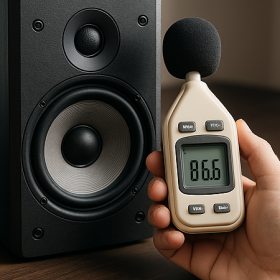Among the various specifications listed for your loudspeakers, you’ve likely come across the term sensitivity. In the context of audio equipment, sensitivity doesn’t refer to emotions—it refers to how efficiently a speaker converts power into sound. In this guide, we’ll explain exactly what speaker sensitivity means and how it affects your listening experience.
Speaker Sensitivity: Overview
In the most straightforward terms, sensitivity is a measure of how loud a speaker is going to sound given a specific amount of power (or ‘voltage’) coming into the speaker. The measurement involves terms like:
- Amplifier: The device delivering the electrical voltage to the loudspeaker
- Watts: Refers both to the amount of voltage being delivered by an amplifier and to the amount of voltage a speaker can comfortably handle.
- dB: An abbreviation of ‘decibel’, a logarithmic unit used to measure the loudness or intensity of a sound.
How is Speaker Sensitivity Measured
Speaker sensitivity is almost always expressed as ‘dB SPL per 1 watt at 1 metre’ — this means the loudness a speaker delivers when powered by one watt and when measured from one metre away (‘SPL’ here means ‘sound pressure level’).
This is by far the most common measurement throughout the audio industry, and is accepted as a standard — by using a consistent measurement, it’s easy to compare the relative sensitivity (and therefore the relative loudness) of different speakers.
So you know a speaker with a sensitivity rating of 87dB will produce 87 decibels of sound if it’s given one watt of power and measured from one metre away.
Why is Speaker Sensitivity Important
Sensitivity measures how efficiently your speaker converts the power it receives into sound — and so it’s a very good indication of how loud your system is likely to sound. So when it comes to matching speakers to an appropriate amplifier, as well as selecting speakers that are up to the job of filling a room of a given size with sound, speaker sensitivity is very useful information to have.
It’s worth bearing in mind that because decibels are a logarithmic unit of measurement, small increases or decreases in the number equate to quite profound effects.
For instance, a 3dB increase means sound energy is doubled, and a 3dB decrease means it’s halved. Our perception of loudness is not linear, either — a 10dB increase will be perceived as a doubling of loudness, but achieving that 10dB increase means increasing sound power by the power of 10.
How Does Speaker Sensitivity Impact Your System?
A speaker with a high sensitivity rating (and ‘high’ tends to mean 90dB or above) needs less power to produce the same volume as a speaker with a low sensitivity rating (and ‘low’ is usually 84dB or below).
If your amplifier isn’t especially powerful, a speaker with high sensitivity will be better able to provide lots of volume than a speaker with low sensitivity — and, of course, the larger the room you want to fill with sound (and the sort of volume levels you like to listen at), the more out-and-out volume you’re going to need.


